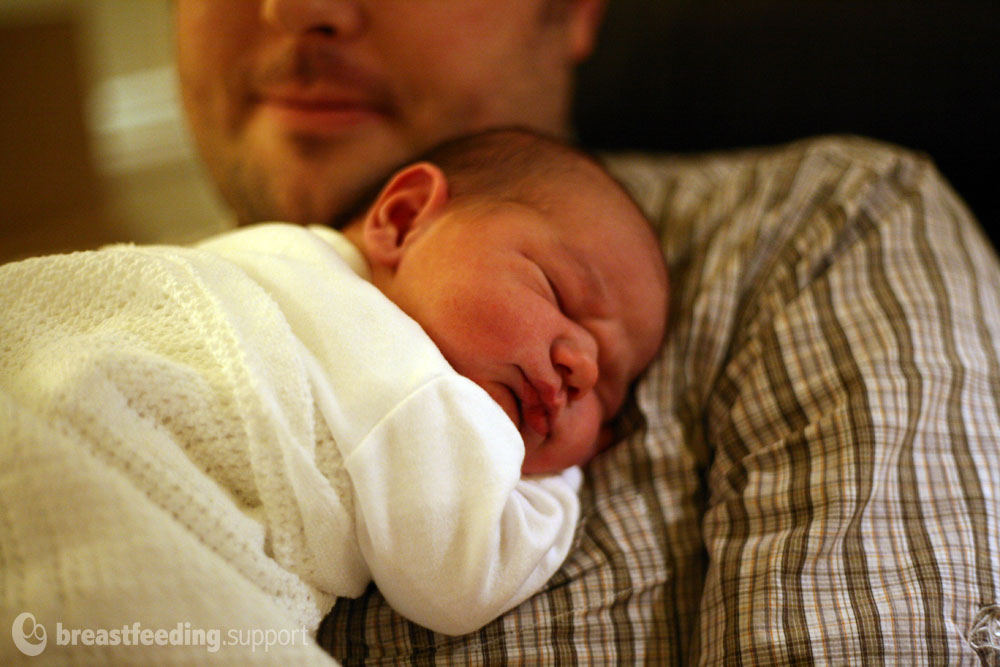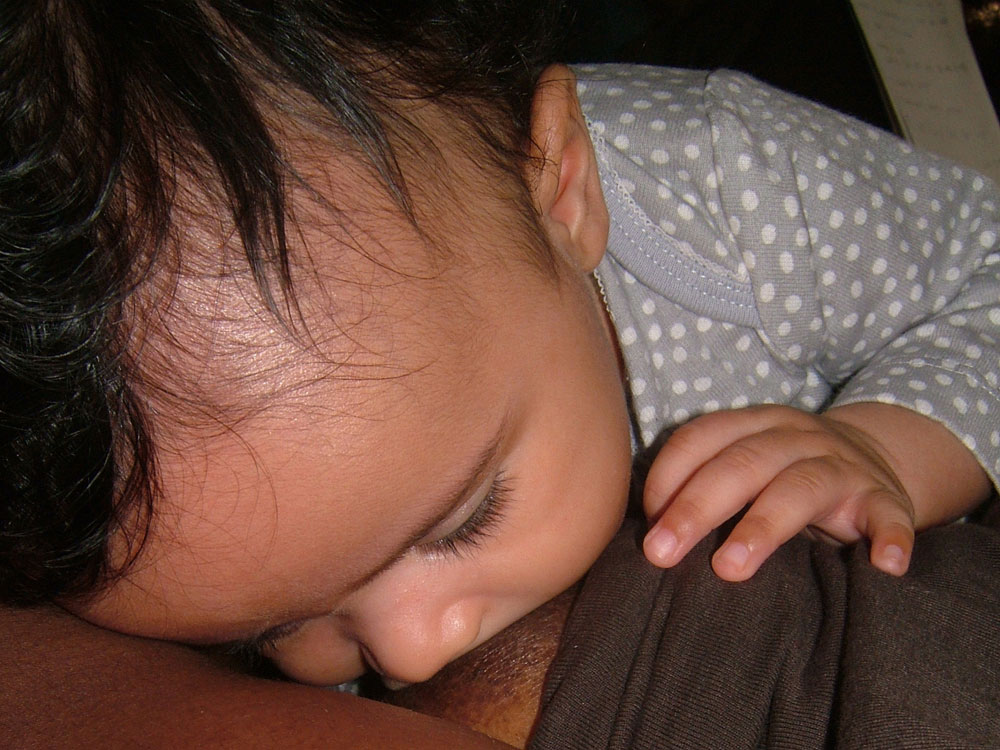Sensory processing or sensory integration (SI) refers to how we process information through our senses of sight, hearing, touch, taste, and smell. Sensory Processing Disorder (SPD), Sensory Processing Difficulties or Sensory Integration Dysfunction are the names used for when the brain struggles to interpret sensory signals correctly. SPD may make normal everyday activities difficult to manage. This article looks at how and why difficulties with sensory processing can affect breastfed babies.
What are the symptoms of SPD?
There are many possible symptoms in babies, children and adults depending which sense or combination of senses are affected. The STAR Institute for Sensory Processing Disorder summarises:
Symptoms of Sensory Processing Disorder, like those of most disorders, occur within a broad spectrum of severity. While most of us have occasional difficulties processing sensory information, for children, adolescents, and adults with SPD, these difficulties are chronic, and they can significantly disrupt everyday life.
One person with SPD may over-respond to touch sensation and find clothing, physical contact, other tactile sensory input to be unbearable and/or they may respond to visual or auditory or another sensory input. Another person might under-respond and show little or no reaction to stimulation, even pain or extreme hot and cold or just may be slow to respond to sensation. In children whose sensory processing of messages from the muscles and joints is impaired, posture and motor skills can be affected.
For further information on the general symptoms of sensory processing disorder The STAR Institute has a Symptoms Checklist for infant, pre-schooler, child and adolescent/adult.

What causes SPD?
Research is ongoing but there are several theories for potential causes for SPD. Possible causes include a result of birth complications, environmental factors, genetic susceptibility or a combination of factors.1
Sensory processing and breastfeeding
Breastfeeding involves a baby giving feeding cues when hungry, being held in close contact, using touch, taste, sight and smell to find the nipple and coordinating suck, swallow, breathe to breastfeed. If a baby has a problem with sensory processing this could affect the steps involved in breastfeeding in a variety of ways. Examples of issues that can impact on feeding include;
- If a baby is super-sensitive to touch he may not particularly like being held during breastfeeding, or being cuddled or rocked—alternatively they may crave to feel held at all times. Some babies may prefer skin-to-skin contact or conversely may prefer to be clothed.
- If a baby is hyper sensitive to movement and body position it may make positioning both more difficult and more important. Many babies don’t like to be on their backs to feed and prefer to be on their tummies with gravity pulling them down against their mother’s body (Watson Genna, 2017).
- If a baby is overly sensitive to light or loud noises this may distract him from feeding properly in certain environments.
- If a baby is very sensitive to hunger they may become disorganised and unable to feed. Babies with feeding difficulties and poor weight gain are more likely to have sensory processing difficulties.2
- If a baby is orally defensive for example doesn’t like the breast deep in his mouth or has a heightened gag reflex it can make breastfeeding challenging.3 Conversely some babies may seem to be unaware of when a soft nipple is in their mouth (Watson Genna, 2017).
- If a baby has difficulty sucking and swallowing, this can make breastfeeding more difficult.
- If a baby is very fussy it may be difficult to calm him so that he can breastfeed.
- If a baby is so placid they are happy whether fed or not fed and do not cue for feeds, it can be difficult to ensure they have enough calories.
Other causes of difficulties breastfeeding
Not all breastfeeding difficulties are due to sensory processing problems, there can be various causes for individual issues. It can be very helpful to rule out other potential causes of feeding issues or fussy behaviour with a breastfeeding specialist before assuming that sensory processing issues are the cause. Examples of other causes for symptoms in the list above include:
- Latch and position. A baby may appear stressed or unhappy at the breast because of the way they are being held (positioning) which can make it difficult for them to attach with a big mouthful of breast as well as the nipple (latch). Problems latching could be varied in individual cases such as difficult positioning with large breasts or flat and inverted nipples, or difficulties with baby latching due to having a tongue-tie or high muscle tone.
- Hungry baby. A baby may be either very fussy or very sleepy at the breast if they are not getting enough milk. They may want to be held all the time or seem to feed all the time if they are very hungry. A number of characteristics that can be typical of a hungry baby are outlined in Baby Not Gaining Weight.
- Allergies. A baby can seem overly sensitive or fussy if they are uncomfortable because of food intolerances or allergies.
- Too much milk. Having a very overabundant milk supply could cause its own issues such as coping with a forceful let-down of milk, a lactose overload or reflux.
Consider contacting a good breastfeeding specialist such as an IBCLC lactation consultant to smooth out any normal breastfeeding related difficulties; most breastfeeding problems will have breastfeeding solutions.

Diagnosis of sensory processing disorder
If, after ruling out common breastfeeding difficulties, or illness, you still suspect your baby may have sensory processing issues consistent with SPD, you can seek help from your heath professional team including a thorough assessment from an Occupational Therapist trained in sensory integration.
Character traits and sensory processing
Good baby, fussy baby
An interesting article in two parts on the Mobi Motherhood International website called Breastfeeding and the Sensory World of Baby shares more examples of sensory integration difficulties, and looks more closely at sensory integration in relation to breastfeeding. The authors explain how a baby’s personality—whether cuddly, uncuddly, up all night, easily over-stimulated, sleepy or fussy can sometimes be connected to a baby’s coping mechanism for sensory overload.
Fussy/Unsettled Baby
Babies do cry, but if your baby cries for hours at a time in spite of what you do to calm him, he may be having difficulty processing the information he is receiving from his senses. People might remark that this baby is easily over-stimulated. Before assuming that sensory issues are involved, talk to your health care provider to rule out other possible medical reasons such as reflux or an injury.Placid/Sleepy Baby
Another baby who is having difficulties might be placid and sleepy, so his sensory difficulties might go unnoticed. If your baby seems sleepy all the time he may be withdrawing from sensory overload. People would often call this child a “good” baby who needs to be awakened to eat. Before assuming though that sensory integration issues are involved, be sure he is eating and gaining weight well, and that there is no medical reason for his sleepiness…
Helping a baby breastfeed with SPD
There are many ways to help a baby with SPD once it has been identified. Whether breastfeeding in a dimly lit room for the light sensitive baby, finding a quiet environment for the sound sensitive baby, or adjusting positioning for the baby sensitive to touch.
- Baby sensitive to touch. Try to identify which body parts are sensitive to touch and be responsive to your baby’s needs. Some babies respond well to skin-to-skin contact, others prefer to wear clothes, some are uncomfortable in certain fabrics. Some babies do not like to be lightly touched and stroked as it overloads their senses but may prefer a firmer touch, massage therapy can be helpful for some babies (Watson-Genna, 2017).
- Baby sensitive to light. If your baby seems sensitive to light, try dimming the lights and avoiding bright lights.
- Baby sensitive to loud noise. If your baby seems sensitive to noise he may tend to shut down and sleep if there is a lot of loud noise. Conversely loud noise may prevent him from sleeping.
- Baby sensitive to smell and taste. Some babies are very sensitive to strong smells e.g. strong perfume, deodorant or lanolin on nipples.
- Baby sensitive to movement. Some babies may prefer constant motion and others prefer to keep very still during a breastfeed.
- Baby sensitive to balance, body position and internal body systems. While some babies need slow sensitive handling and may prefer to be put down in a crib to sleep, others prefer to be held while they sleep or feel contained in a sling. Some babies are particularly sensitive to their internal mechanisms e.g. if they feel they need to urinate or poop they may not be able to breastfeed until the sensation has passed. Hunger can cause some babies to become very anxious and uncoordinated.
Breastfeeding and the Sensory World of the Baby, Part II, Beverly Morgan et al, [no date], has many ideas to help babies who are sensitive to touch, light, sound, smell, taste, movement, and balance, and lists additional helpful resources, books and websites to guide parents as their baby grows. In practice a baby may have sensitivities in more than one area.

Summary
Sensory Processing Disorder can present some challenges to the breastfed baby and may often be undiagnosed as a source of difficulty. Once identified by your healthcare team there are help and resources available.